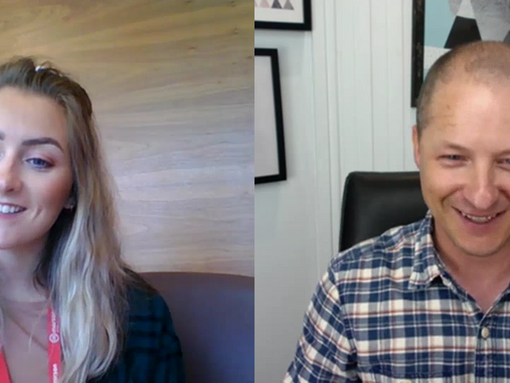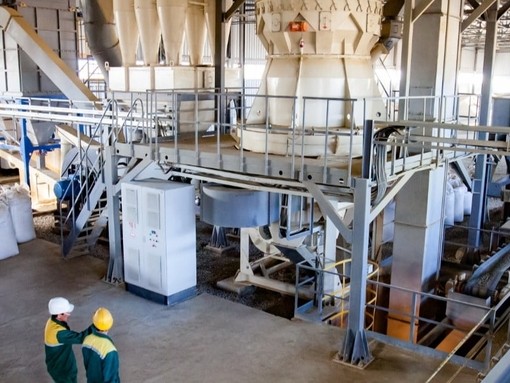
Goodbye career ladder... hello 'squiggly' career path
The coronavirus pandemic was one of the most profound disruptors of traditional working arrangements of modern times, with agile and remote working solutions being implemented quickly, along with furlough, re-assignment and redundancies all being commonplace as industries adapted to the economic and practical impact of lockdowns.

For some candidates, it allowed a reset of their goals, aspirations, and career plan. Whether this was a complete shift to a different career, industry or personal target or a further development on an existing path, change is something that many people embraced, even during a time of great uncertainty in the jobs market.
Furthermore, those people who were furloughed and then returned to their old roles after, in some cases, over 12 months of temporary unemployment, found that these roles had drastically changed, resulting in rapid adaptation and the need to embrace new skills.
With changing times comes a change in the way we perceive career progression.In a candidate-led recruitment market, people are saying goodbye to the traditional career ladder, and instead, embracing a ‘squiggly career path’. But what does this mean, and how can you take advantage of it?
What is a squiggly career?
The idea of a non-linear career isn’t a new one. Dominic Cadbury famously said “There is no such thing as a career path. It’s crazy paving and you have to lay it yourself.” The term ‘squiggly career’ is a modern take on this phenomenon, coined by Helen Tupper and Sarah Ellis.
The key characteristics of a squiggly career include change, uncertainty, and possibility. Squiggly careers are a reality for most people, even those working in a more traditional working environment. This is because of the nature of the working world in the 21st century, the types of jobs that we are doing now and the fact that the rate of change is increasing. The future of work looks to be embracing more freelance opportunities, greater travel potential and a bigger reliance on technology, and these factors combine to make our working lives less predictable and more malleable to change. For example, in 2022, only around 6% of workers in the UK work the hours of 9am to 5pm.
It’s important to distinguish between what a squiggly career is and what it isn’t. What it isn’t is simply moving around from job to job frequently without reason, merely for ‘something new’. Squiggly careers embrace how you think about learning, development and growth, how you embrace existing strengths, refined abilities and your own personal goals in a dynamic way. It’s about having an open mindset of laying out your ‘crazy paving’ in a way that best suits your skills and aspirations, forging a custom path that means you are always growing and developing in a satisfying way.
Squiggly careers can feel incredibly satisfying when opportunities are grasped but can sometimes feel overwhelming if you’re unsure what you need to do. So, what skills do you need to make the most of your squiggly career journey?
Thriving in a squiggly world
Strengths
Everyone has different skills, but everyone likes to do good work. How you make your strengths stand out at work is one element of embracing a squiggly career journey, since they are the building blocks of any successful career journey - but how do you find out what they are?
Strengths are important. They’re the things you’re great at that you take with you from job to job. Strengths are one of the few consistencies in a world of uncertainty and change. They are things that you stand for and most importantly have control of. Sometimes finding them can be more difficult. Strengths are often something that you must look for in yourself, but there is a process to help you get started. Saying what you think they are out loud, for example, to someone else is a good place to start. This is useful because it trains you to speaking openly about what you feel your key stills are.
If you’re still struggling to figure out your strengths, ask a family member, friend or colleague to describe you in a few words. Other people can almost always see our strengths more clearly than we can.
Often, your strengths are manifested in the elements of your job that you enjoy the most. This is a normal human reaction, as the strength within you produces the best work, which in turn produces a feeling of satisfaction, pride or achievement. These strengths can then be distilled and applied elsewhere. For example, if you feel your strengths are mentoring a new starter, this broad skill could be further refined into a more formalised management role.
It’s important to make it known what your strengths are. As a result of not standing out, people miss, or aren’t offered, the opportunity to do more of it and in turn create more value for your company. It’s a self-perpetuating, potentially damaging cycle.
In The Squiggly Career by Helen Tupper and Sarah Ellis, the lesson is to focus on strengths rather than our weaknesses and accept that we cannot be good at everything. The book provides a very helpful tip: spend 80 percent of your time optimizing your current strengths, and 20 percent working on other areas, for example skills that may be useful for the future.
The key is to be able to talk about the two or three things that make you distinctive and stand out from the crowd. This is important not only for your self-confidence but also for other people’s confidence in you.
Follow your values
Your values are what drive you and are your reason for making decisions in both your career and life in general. One of the positives to come out of the coronavirus pandemic is that it’s seen a shift in the average worker’s attitudes towards finding a career path, and an employer, that more closely aligns with their values. ‘Purpose over paycheque’ is one of the strongest drivers in people’s decision to move roles and develop their career in different ways.
Most people only have one set of core values which impact all aspects of their life. Defining yours is the first step towards forging a career that is rewarding for both you and those around you.
With the high demand for talent, companies are now not only checking their remuneration and benefits packages alongside a new hybrid and flexible way of working, but they too are beginning to set their own ambitious targets to help tackle the growing issues such as global warming, so when searching for a role look for the companies that share your values.
Revaluate your values from time to time to make sure your career choices align with them. Take time to understand other people’s values within your team, particularly if you’re in a managerial role. Empathy goes a long way towards creating an environment where all can flourish.
Remember: there are no right or wrong values, so be honest with yourself and don’t be afraid to be different.

Develop your confidence
Confidence is your self-belief. While few people respond well to over-confidence or arrogance, a lack of it can often hold you back. A good example would be a fear of failure. This can be detrimental and result in unfulfilled potential within your career. Confidence is a skill that can be learned but also one that needs practice, particularly if something out of your control knocks it back.
It’s very common for people to feel imposter syndrome, particularly when starting a new role, and question whether they’re good enough. To overcome your gremlins, test them by taking small actions, like sharing even minor achievements with your colleagues and networks. Reward yourself for taking actions to test these gremlins.
In the workplace, some of the most confident individuals often have support systems of other confident individuals around them. Most people have someone they can talk to on a personal level within a workplace, so find your confidence network to enable you to get the most out of your strengths.
Build a network and learn from them
Behind every great person is a group of people who have helped them achieve. Networking is people helping others, and when you have a network of multi-skilled, authentic people around you, you can benefit in two ways. Firstly, you can benefit from their knowledge and experience, but secondly you can give the gift of your own skills and expertise. Highlight your strengths and passions and take advantage of opportunities to introduce yourself to people who might be able to benefit from them. In turn, you will likely find that these people have expertise in areas where you may have gaps. This two-way conversation can be beneficial for all and open potential opportunities further along your squiggly career journey.
Don’t expect immediate gains, however. Consider your network like your career garden – something that takes time to grown and nurture before the fruits can truly be seen.
Act to benefit the future you, not just the current you
It’s important to drop the predefinitions of what your career progress (ladder) should be and treat yourself as a work in progress. Keep building on your existing skills and don’t stand still. Your strengths, when developed and expanded, can open new doors you may not have thought of. Develop a personal manifesto, combining your strengths, networking, values and goals to motivate yourself into achieving that career nirvana.
As you move from role to role, reflect on what went well and what didn’t go as well to help chart a course towards a more well-rounded and dynamic future ‘you’. Listen to feedback, stay curious and adopt the growth mindset.
There are lots of different ways to learn so you aren’t dependent on being led towards specific training by your employer, though be sure to take advantage of relevant courses offered - and don’t dismiss learning on the job! Be very intentional about what you want to learn, and learn from those around you, always keeping in mind your goals along the way. Ask yourself – how will what I’m learning benefit what I want to achieve in the future?
There’s no fixed destination, but the journey along the way will result in you being the best version of ‘you’ that you can be. Follow all of the above and you’ll be well on your way to laying the crazy paving for your squiggly career journey!
With a unique 50 year heritage of innovative recruitment, we are a diverse group with an outstanding reputation for delivering consultancy, design, technology, training and people solutions around the world.
Find out how our breadth of industry and skills knowledge can help you make your next career move here
















